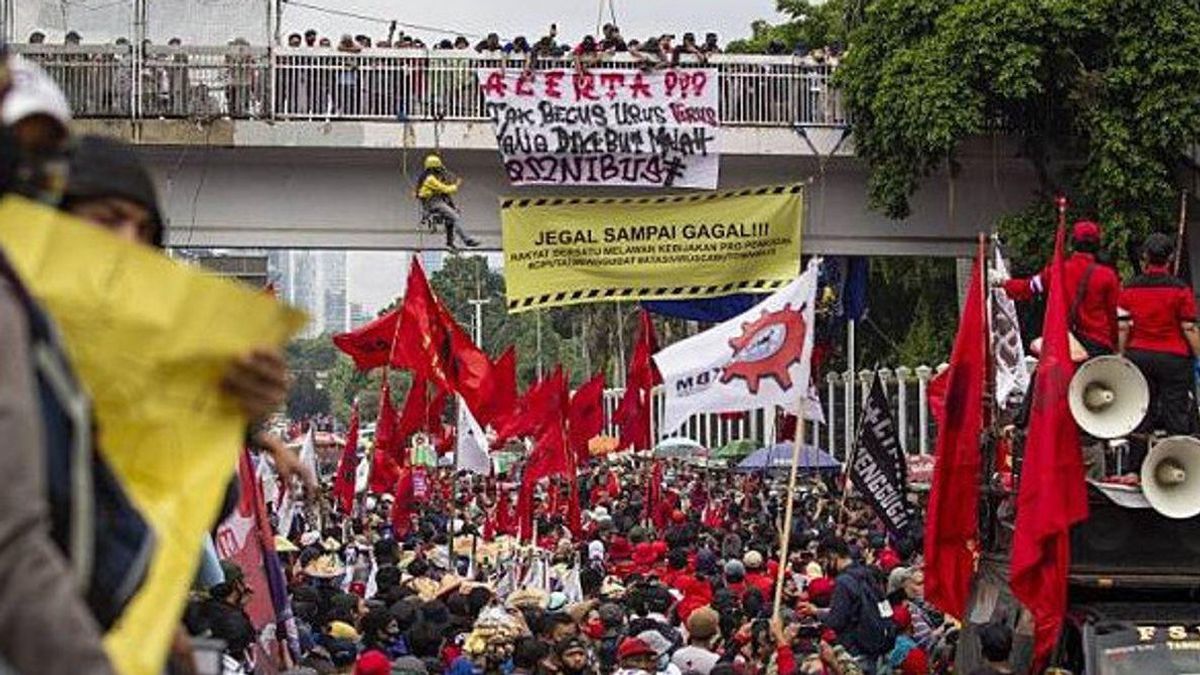JAKARTA - The workers plan to strike on December 6-8. This national-scale movement was carried out as a form of protest against the government's decision to only increase the 2022 minimum wage by 1.09 percent. We often hear about labor strikes. But do you know the big impact that might arise from a labor strike? This is not the reason why workers use strikes as their main weapon in dealing with many labor problems.
"The principle of this national strike is to stop production on December 6, 7, 8, 2021," said President of the Indonesian Trade Union Confederation (KSPI) Said Iqbal at an online press conference, Friday, November 19.
This national strike plan will be carried out in 30 provinces and 150 regencies/cities and will be followed by 60 trade union federations and five trade union confederations. It is estimated that there will be millions of workers involved in the national strike which is planned to start at 08.00 to 18.00 in each time zone.
According to the plan, the strike will also be accompanied by demonstrations in the factory environment where the workers work. Said Iqbal explained that the legal basis used by workers was "Law Number 9 of 1998 (Regarding Freedom of Expressing Opinions in Public)."
"We are not using a strike, we are going on a national strike. Not a strike. Because it uses Law 9/1998, the location for this national strike or national demonstration is the one in the factory where production stops and leaves the factory," he added.
This protest action will bring two demands. First, the government should increase the provincial minimum wage (UMP) and district/city minimum wage (UMK) by at least 7 to 10 percent.

The second demand is for the Constitutional Court (MK) to revoke Law Number 11 of 2020 concerning Job Creation, especially the employment cluster. This action, said Iqbal, will also be supported by farmer and fisherman groups.
"Stop production. Leave the production room to the factory environment," Said Iqbal.
The Indonesian Employers' Association (Apindo) responded to the threat of a strike by the workers. Director of the Apindo Research Institute, P. Agung Pambudhi assessed that the national strike planned by the workers was not in accordance with the provisions of Article 140 of Law Number 13 of 2003 concerning Manpower.
Agung explained, in the regulation, a strike is only allowed when there is a failure in negotiations between the employer and the worker. Agung assessed that there were no failed negotiations between the two parties.
Second, Agung revealed the contents of Article 6 of the Decree of the Minister of Manpower and Transmigration which explains that a strike must be carried out by sending a notification letter to the police and the Manpower Service within seven days before its implementation. If it is not carried out, the strike can be considered absenteeism.
When categorized as absenteeism, employers have the right to call workers to return to work. However, if within seven days two summons are made and the calls are not fulfilled, then the worker is considered to have resigned.
"If the worker does not fulfill the summons, it can be considered as resigning, this is the norm," said Agung.
Strike as a labor weaponResearcher from the Institute for Development of Economics and Finance (INDEF) Nailul Huda explained that the impact of the strike was very large. This can be seen from the smallest scale on the company side to the national scale.
The strike of workers will reduce the productivity of the company. Production will be hampered. It will affect the national context.
"This will disrupt output performance, the value chain will also be disrupted. The manufacturing sector is highly interconnected. So if the manufacturing industry crashes, other sectors will also be disrupted," said Huda, to VOI, Tuesday, November 30.

These kinds of things show how important the role of workers is for the national economy. And it is natural that strikes are the main weapon for workers to deal with labor issues.
Even so, Huda said that the threat of workers should be responded to cooperatively by the company. Apart from having the right of workers to express their aspirations, the interests of workers are actually also the interests of the company.
"Well, the company should also encourage the right increase. After all, the money will go back to the producers in the form of purchasing goods by the household sector (labor)," said Huda.
"In economic theory, as long as our industry is in the form of an oligopsony (only a few buyers of labor services), then when there is an increase in the minimum wage, there is still an increase in the demand for labor."
"Companies also need labor for production. So from what I see it is just a trick by entrepreneurs to reduce labor costs. What is certain is that the production function is capital and labor. If you want to increase production, you must also add inputs (capital and labor)."

According to Huda's calculations, it is still possible to increase the wages of workers, at least at least 8 percent. This cannot be separated from the problematic context of the job creation law. In the old regulation, namely Government Regulation No. 78, the formulation for determining the minimum wage is regulated by considering indicators of economic growth plus inflation expectations.
"Use that theory, sir. So if the increase is still below the equilibrium wage, and definitely below equilibrium because the bargaining position of workers is weak, wages can still go up. So when wages only increase by 1.09 percent, I think it's really small."
"He said next year 5 percent plus inflation of 3 to 3.5 percent. It should be able to increase at least 8 percent. So it's natural for workers to strike. Yes, it's a form of protest against setting a very minimal wage increase. In Banten, it's even only 40 thousand. In which area is that only thousands. Even though the price of goods is very volatile and the government has failed to stem the increase in the price of goods, which makes people scream."
*Read other information about the WORKING CLASS or read other interesting articles from Yudhistira Mahabharata.
Other BERNASThe English, Chinese, Japanese, Arabic, and French versions are automatically generated by the AI. So there may still be inaccuracies in translating, please always see Indonesian as our main language. (system supported by DigitalSiber.id)








